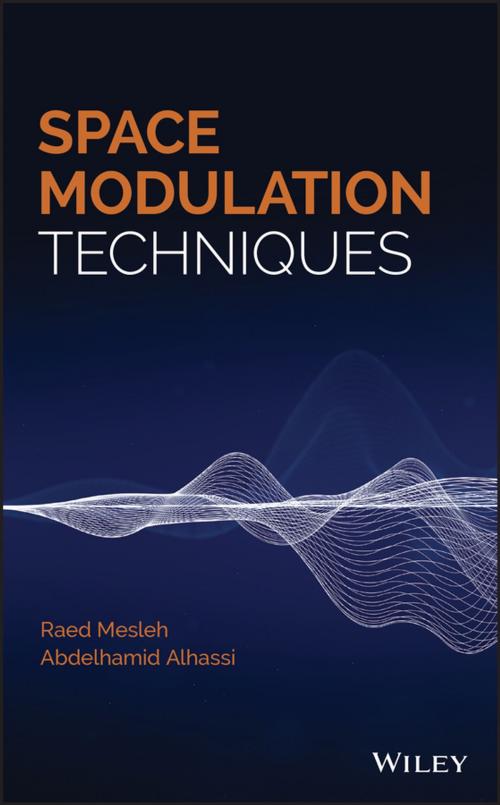| Author: | Raed Mesleh, Abdelhamid Alhassi | ISBN: | 9781119375685 |
| Publisher: | Wiley | Publication: | May 11, 2018 |
| Imprint: | Wiley | Language: | English |
| Author: | Raed Mesleh, Abdelhamid Alhassi |
| ISBN: | 9781119375685 |
| Publisher: | Wiley |
| Publication: | May 11, 2018 |
| Imprint: | Wiley |
| Language: | English |
Explores the fundamentals required to understand, analyze, and implement space modulation techniques (SMTs) in coherent and non-coherent radio frequency environments
This book focuses on the concept of space modulation techniques (SMTs), and covers those emerging high data rate wireless communication techniques. The book discusses the advantages and disadvantages of SMTs along with their performance. A general framework for analyzing the performance of SMTs is provided and used to detail their performance over several generalized fading channels. The book also addresses the transmitter design of these techniques with the optimum number of hardware components and the use of these techniques in cooperative and mm-Wave communications.
Beginning with an introduction to the subject and a brief history, Space Modulation Techniques goes on to offer chapters covering MIMO systems like spatial multiplexing and space-time coding. It then looks at channel models, such as Rayleigh, Rician, Nakagami-m, and other generalized distributions. A discussion of SMTs includes techniques like space shift keying (SSK), space-time shift keying (STSK), trellis coded spatial modulation (TCSM), spatial modulation (SM), generalized spatial modulation (GSM), quadrature spatial modulation (QSM), and more. The book also presents a non-coherent design for different SMTs, and a framework for SMTs’ performance analysis in different channel conditions and in the presence of channel imperfections, all that along with an information theoretic treatment of SMTs. Lastly, it provides performance comparisons, results, and MATLAB codes and offers readers practical implementation designs for SMTs. The book also:
- Provides readers with the expertise of the inventors of space modulation techniques (SMTs)
- Analyzes error performance, capacity performance, and system complexity.
- Discusses practical implementation of SMTs and studies SMTs with cooperative and mm-Wave communications
- Explores and compares MIMO schemes
Space Modulation Techniques is an ideal book for professional and academic readers that are active in the field of SMT MIMO systems.
Explores the fundamentals required to understand, analyze, and implement space modulation techniques (SMTs) in coherent and non-coherent radio frequency environments
This book focuses on the concept of space modulation techniques (SMTs), and covers those emerging high data rate wireless communication techniques. The book discusses the advantages and disadvantages of SMTs along with their performance. A general framework for analyzing the performance of SMTs is provided and used to detail their performance over several generalized fading channels. The book also addresses the transmitter design of these techniques with the optimum number of hardware components and the use of these techniques in cooperative and mm-Wave communications.
Beginning with an introduction to the subject and a brief history, Space Modulation Techniques goes on to offer chapters covering MIMO systems like spatial multiplexing and space-time coding. It then looks at channel models, such as Rayleigh, Rician, Nakagami-m, and other generalized distributions. A discussion of SMTs includes techniques like space shift keying (SSK), space-time shift keying (STSK), trellis coded spatial modulation (TCSM), spatial modulation (SM), generalized spatial modulation (GSM), quadrature spatial modulation (QSM), and more. The book also presents a non-coherent design for different SMTs, and a framework for SMTs’ performance analysis in different channel conditions and in the presence of channel imperfections, all that along with an information theoretic treatment of SMTs. Lastly, it provides performance comparisons, results, and MATLAB codes and offers readers practical implementation designs for SMTs. The book also:
- Provides readers with the expertise of the inventors of space modulation techniques (SMTs)
- Analyzes error performance, capacity performance, and system complexity.
- Discusses practical implementation of SMTs and studies SMTs with cooperative and mm-Wave communications
- Explores and compares MIMO schemes
Space Modulation Techniques is an ideal book for professional and academic readers that are active in the field of SMT MIMO systems.















